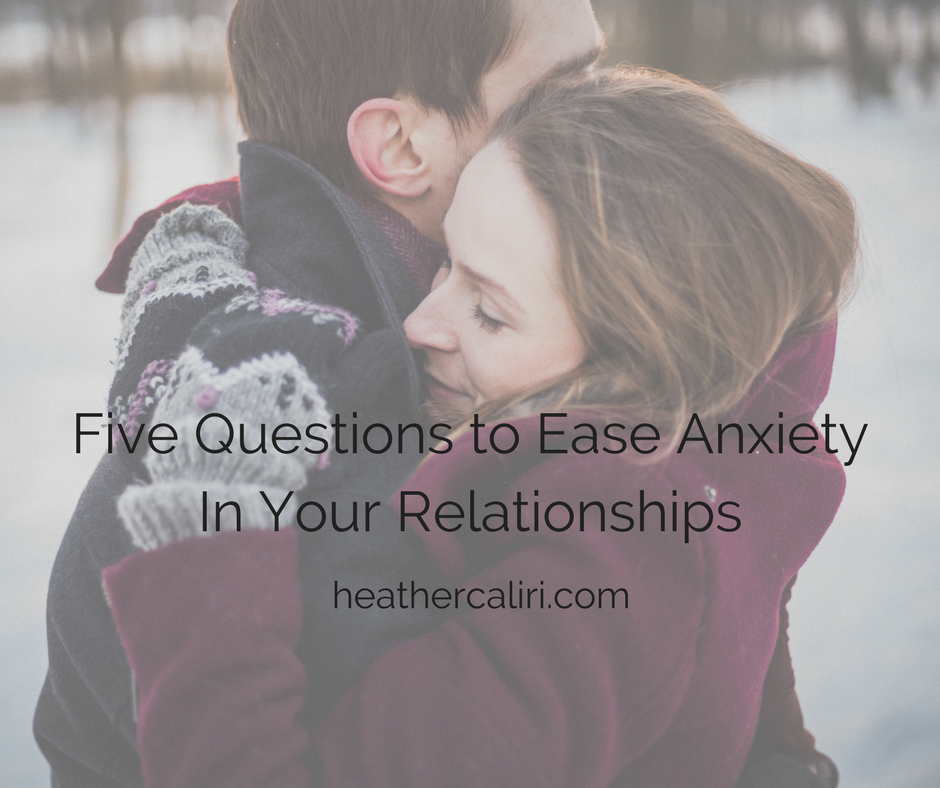
I’m doing a five-part series on questions to ask about your closest relationships to figure out if they might be the root of some anxieties. You can see the whole series here.
A friend of mine was sexually abused in high school. Her abuser kept her from ending their “relationship” for two years by regularly threatening to kill himself.
I’ve had someone use this threat against me as well. Unfortunately, it’s not uncommon.
When I heard the threat of self-harm the first time, I actually registered it as a compliment. I thought the person speaking loved me so much they couldn’t survive without me. Only years later did I realize how out-of-bounds such statements are. Whatever the person’s intentions were, their talk of self-harm made me feel trapped, unable to put up healthy boundaries for fear of them hurting themselves.
But threats don’t need to be so dire.
- Someone could give you silent treatment if you disagree with them.
- They could withhold something (like sex) if you displease them.
- They could hint that they’ll end the relationship if you act a certain way, or don’t act a certain way.
Unfortunately, this behavior is considered normal. For instance, I just saw an old episode of Gilmore Girls where Lorelei, justifiably frustrated by Luke’s foot-dragging about their wedding, tells him that he can either get married to her the next day, or their relationship is over.
It’s the first time she’s mentioned she’s annoyed or concerned about his slowness; she gives him two minutes to make up his mind. (I swear, all screenwriters search psychology manuals for what not to do.)
Threats, ultimatums, and manipulation are sort of the shadow side of real boundaries.
It’s totally okay to say, “Enough, I can’t handle this anymore.” Okay to say no. But how you do it matters.
Here’s the difference between manipulation/threats/ultimatums and actual boundaries.
Healthy boundaries avoid being punitive.
This was a big aha moment with me when I got therapy.
Anytime I am angry, and feel like doing x, y, or z, I ask, am I doing this to punish the other person? If so, it’s probably a bad idea.
(So “They’ll be sorry” thoughts are a big red flag.)
After I stopped doing punitive stuff, I’ve become more aware of why certain attitudes, comments, or silence make me so anxious. There’s almost always some kind of payback hidden inside.
- The silent treatment is sort of ostracism lite; it’s extremely punitive.
- Withholding sex without respectful discussion or explanation? Also punitive.
- Ditto any kind of sulking, mockery, or passive aggression.
If the person you’re in relationship with makes you pay for mistakes, disagreements, or hurts, you will be anxious around them.
Healthy boundaries are transparent.
Sometimes during an argument with my husband, I’ll get so upset that I can’t keep talking. In the past, I’ve left in a huff, without any explanation. That’s the silent treatment.
Oops.
I now know to say, “I need a break to calm down. Could we talk about this tomorrow morning, when we’ve rested?”
The transparency makes all the difference.
Take Lorelei. Rather than suffering in silence, she needed to communicate respectfully and openly the very first time she felt frustrated. If she’d done that, she would have arrived at a breakup conversation on completely different ground. Rather than blindsiding Luke with a demand, he would have known what his choices were and had time to reflect and act.
Breaking up still would suck. But at least it would have been respectful.
If someone constantly pulls the rug out from under you, expects you to read your mind about what they need from you without having to communicate it, then you will feel anxious around them.
Healthy boundaries take responsibility.
You know what phrase I hate? “You made me.”
People are in charge of their behavior. Period. So if I yell at my kids when they act out, they didn’t make me yell. I chose to yell. (Sometimes I choose to yell more often than I’d like.)
If Lorelei told Luke, “You made me break up with you,” that’s a crock of *&^%. Even if his behavior was completely out of line, he didn’t make her call off the wedding.
She chooses. He chooses. Everyone gets to choose.
A lot of us, unfortunately, are in manipulative relationships, where the person is actually trying to make you do something specific. Even then, you can choose to say no.
This doesn’t mean we condemn people in abusive relationships. Sometimes psychological pressure is so harsh that it can be well-nigh impossible to exercise our agency. In theory, I’d still say that if you’re an adult in the US, there are (sometimes dangerous) choices to make, but in practice I can’t ever judge someone who is afraid to take action under a threat of violence.
But in most situations, with most kinds of manipulation, we must take responsibility for our own choices, not anyone else’s.
When we taking responsibility for our own choices, you start recognizing when people try to get you to take blame for stuff they do.
It’s a win-win: be more of a grownup yourself, and also increase your awareness of manipulators.
Those who try to tell you they have no choices, who pawn off blame on you will make you anxious. Best to figure out what you want apart from any pressure. If you do that, you’ll be much less anxious.
Why Boundaries are Harder than Ultimatums
Threats, manipulation, and ultimatums don’t require you to communicate what you want. They don’t require you to be vulnerable. They don’t require you to take responsibility for your own actions and own your choices.
They make the other person do all the hard work.
It feels easier, but in the long run, it shrinks your heart and your courage.
It’s not worth it.
Learning how to own your own choices, be transparent about what you need, and how stop punishing other people when they hurt you will eliminate a lot of nonsense from your life. You’ll be softer and more vulnerable, yes, but also a crazy love warrior, in Glennon Doyle Melton’s words.
Knowing what you want, asking for it directly, and saying no to manipulation will protect you from unsafe people. It disarms most of their arsenal and puts you on a level playing field.
Once you figure out whom is straightforward about what they need from you, you’ll become much less anxious. Rather than guessing, placating, or endlessly mending fences in your main relationships, you’ll know what others need from you, and can choose your actions accordingly.
It feels scary to be that forthright and honest. But in the end, real maturity feels like freedom.













 Dear Awkward: Annoyed at Church
Dear Awkward: Annoyed at Church
This is a great article, first my wife and I watch the Gilmore Girls al the time. I shared this post with her, we were just watching this episode you quoted recently. Next I feel this way about the church as a whole in certain situations, I am going to try your recomendations, knowing what I want is hard, because I battle between what I want and what I should want. I believe my choice is going to be wrong, and result in me going down a dark path, even though I know it won’t. Thanks for the article.
thanks, Steven. yes, it’s hard to be whole-hearted for all of us when we feel hurt. These power dynamics definitely play out in church too. Praying you have wisdom for how to work through all that complexity.